I love to read, and so I want to write things that I would like to read. It’s the only thing more rewarding than reading for me.

Jac Jemc lives in Chicago where she makes monsters and writes fiction and poetry. Her first novel, My Only Wife, was published by Dzanc Books in April 2012 and a chapbook of stories, This Stranger She’d Invited In, sold out at Greying Ghost Press in March 2011 . Jac’s writing has been twice nominated for a Pushcart Prize, finished 2nd place in the Marginalia College Contest and placed as a finalist for the Rose Metal Press Chapbook Contest and Sentence Firewheel Chapbook Contest. Her story “Women in Wells” was featured in the 2010 Best of the Web. Jac received her MFA from the School of the Art Institute of Chicago and has completed residencies at Ragdale and the Vermont Studio Center. She is poetry editor at decomP and member of the editorial team at Tarpaulin Sky. She has served as a guest editor of Little White Poetry Journal and and Hobart Web, and worked as a reader at Our Stories and The Means. In 2012 she was the recipient of an Illinois Arts Council Professional Development Grant.
Visit her web site: http://jacjemc.com
Story: Prowlers at Necessary Fiction
How Jac Jemc Became a Writer
This is the next installment in the How to Become a Writer interview series, which will post here at Ph.D. in Creative Writing every other Sunday (or so) until I run out of writers to interview, or until they stop saying yes. Each writer answers the same 5 questions. Thanks to Jac for saying yes!
1. Why did you want to become a writer?
When I was in the third grade, I told my teacher my dream was to write a 100-page book. Then I forgot about that for a while, and tried some other things: music and acting, but I continued being a big reader. When I was in college I started writing again more seriously, and I realized how important it was to me, and that I could accomplish what I wanted to express in a way I hadn’t been able to achieve before. The more I read, the more ways of telling a story there seemed to be, and that made writing more and more attractive to me. I was finishing out a degree in theater, but I discovered that I really preferred working alone. I think I might not be a terrific collaborator because I tend to want to follow through my own idea from beginning to end, and theater had a few too many variables for me. I think the short answer though, is that I love to read, and so I want to write things that I would like to read. It’s the only thing more rewarding than reading for me.
2. How did you go about becoming a writer?
So all of the things I just said go into the actual steps to ‘becoming a writer.’ But I started a double major in English Creative Writing and worked with some terrifically supportive professors in undergrad. I made a couple independent studies in novel writing and playwriting (which I realized was not for me) that seemed super important to my development. The novel writing independent study was with a poetry teacher, so I was already on the road to hybrids. When I started looking at grad schools, the School of the Art Institute of Chicago seemed ideal because they’re one of the only schools that doesn’t make you choose a concentration. You can take a poetry class and it might be full of painters who want to talk language and you can take a fiction class that’s full of poets, and the world just opens up. Luckily (haha) it was the only school that I was accepted to, so I wasn’t given the chance to mess up that decision. At SAIC, students have the option to meet weekly with advisors, which I found to be the most valuable part of that program. I started by setting goals for how many hours a week I want to write. I try to stick to a schedule – if not a regular time every day to write, a certain number of hours a week. Of course, life intervenes and messes with the schedule often, but setting that expectation and working for it is what makes me feel like I can call myself a writer. As soon as I stop making that time a priority is when I’m in jeopardy of “writer” not being a word that applies to me.
3. Who helped you along the way, and how?
Those advisors in grad school were huge helps. They taught me how to ask the right questions, and the right question is usually, “Is this what I want it to be? How do I make it what I want it to be?” Advisors that were invaluable to me were Beth Nugent, Janet Desaulniers, Carol Anshaw, Ellen Rothenberg, Bin Ramke. I could go on; the whole community was just life-changing. My peers are my biggest motivator now. I’m surrounded by people that write AMAZING work that is exactly what I want to read. I see how hard they work and how true they are to themselves, and I makes me want to work harder.
4. Can you tell me about a writer or artist whose biography inspires you?
Edward Gorey comes to mind. What an entirely singular vision. He made what he wanted to make even though there was no category for it, and he lived his life in a way that seemed just wholly true to himself, too. And he LOVED to work! That is so exciting to me.
Eileen Myles, too. Her novel, Inferno is about her life, and she is such an inspiration. She was so fearlessly herself. Patti Smith, too. Lynda Barry. Andy Warhol. All of these people have a way of weaving their work so seamlessly into their lives. That sounds like the perfect world to me, to erase that divide between my creative life and the work it takes to live and keep going.
Book trailer for Eileen Myles, Inferno:
5. What would you say in a short letter to an aspiring writer?
I’d say: Read. Write exactly what you want to write, even if it seems like a piece of crap while writing it. Learn how to listen to criticism in a way that allows the writing to become better, but learn how to recognize the suggestions you do and don’t want to follow through with. See lots of art and watch movies and be with people and live your whole life. It’s easy to feel like you need to accomplish everything immediately, but you need to live, too. There is time. So much time. You can be Woody Allen and put out a movie every year, whether it’s good or bad, or you can be Terrence Malick, making a film a decade: whatever works for you. Read and write.











love her answer to number 5 and that she writes what she would want to read
I agree, Homefront. I also think ‘write what you want to write’ goes with that because sometimes the reading aspect is a step too far away. Sometimes I have felt/feel compelled to write something other than what comes naturally and it rarely works. What I want to write often doesn’t work either but at least it’s more enjoyable.